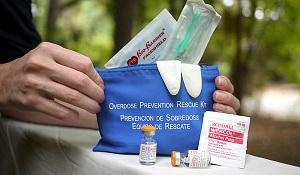The Justice Department signals it will appeal a federal court ruling invalidating the federal ban on guns for pot users, Colombia calls for coca leaf decriminalization, and more.

Justice Department Now Accepting Applications for Pardons for Federal Marijuana Possession Offenders. Nearly five months after President Biden called for pardons for federal marijuana possession offenders, the Justice Department has begun accepting applications for those pardons. The move comes after a series of friendly public statement from the administration about the drug from both Attorney General Garland and the president. Last week, Garland said that Justice is working on a review of marijuana policy, and just days before that, President Biden mentioned the pardons in a Black History Month speech, saying "too many minorities are in prison" for marijuana use.
Justice Department Appeals Federal Court Ruling Striking Down Gun Ban for Marijuana Users. The Justice Department last Friday filed paperwork in US District Court for the Western District of Oklahoma informing the court that it intends to appeal a judge's ruling there that found unconstitutional the federal prohibition on gun ownership for marijuana users. The Friday filing did not make a substantive argument but served primarily as a notification that an appeal was coming. In that district court ruling, Trump-appointed Judge Patrick Wyrick held that a recent Supreme Court ruling where the high court created a higher standard for policies that aim to restrict gun rights made the ban on gun possession unconstitutional.
Oklahoma Votes on Marijuana Legalization Today. In an election with no other issues or races on the ballot, voters will decide whether or not to approve a marijuana legalization initiative, State Question 820. The measure is opposed by law enforcement and most of the state's Republican political establishment. It would allow people 21 and over to possess up to an ounce of marijuana and eight grams of marijuana concentrates and grow up to six plants and six seedlings at home. It also protects parents from losing custody or visitation rights solely because of marijuana use and states that parolees and probationers cannot be punished for marijuana use. Nor could the odor of marijuana or burnt marijuana be used as probable cause for police to infer that a crime had been committed. And it includes a provision for the expungement of some past marijuana offenses. It also sets a 15 percent excise tax on retail marijuana sales.
Medical Marijuana
South Dakota House Approves Medical Marijuana Expansion Bill. In a narrow vote, the House on Monday approved Senate Bill 1, which expands the list of qualifying conditions for medical marijuana use to include people afflicted with cancer, epilepsy, MS, ALS, PTSD, Crohn’s disease, aids, and HIV. The bill has already passed the Senate, but must go back for one more concurrence vote because it was modified in the House. If it wins that vote, it would then go to the desk of Gov. Kristi Noem (R).
Harm Reduction
Oregon House Approves Bill to Expand Naloxone Access. The House has approved a bill to more widely distribute the opioid overdose reversal drug naloxone (Narcan), House Bill 2395, on a vote of 48-9. The bill declares a health emergency and will make overdose reversal kits available in libraries, churches, and other public buildings. It also allows police, firefighters, and EMTs to distribute the kits to drug users and their friends and family members, and it decriminalizes fentanyl test strips. The bill now heads to the Senate.
International
Colombia Vice President Calls for Coca Leaf Decriminalization at UN. Vice President Francia Marquez used an address at the UN Permanent Forum on Indigenous Issues to petition for the decriminalization of the coca leaf in the country's indigenous territories. "The time has come to sincerely put the debate on decriminalizing the use of coca leaf in ethnic and indigenous territories, continuing to criminalize the use of coca leaf will not allow Colombia to achieve total peace," she said. "Because we know that it has been this criminal, racial policy that has us as peoples suffering terrible humanitarian crises, it is the drug trafficking imposed from that criminal policy that today is generating armed conflicts in ethnic territories." Colombia will join Bolivia in petitioning the UN Commission on Narcotic Drugs to remove coca leaf from its list of prohibited substances.
This work by StoptheDrugWar.org is licensed under Creative Commons Attribution-ShareAlike 4.0 International
Add new comment